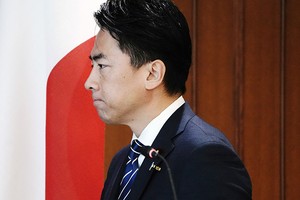Vox Populi, Vox Dei is a daily column that runs on Page 1 of The Asahi Shimbun.
October 18, 2021 at 13:11 JST
 Syukuro Manabe speaks to reporters at his U.S. home on Oct. 5. Excerpts from Seigo Shirotori’s “Yukei,” left, and Yasushi Inoue’s “Uzu” hang on the walls. (AP file photo)
Syukuro Manabe speaks to reporters at his U.S. home on Oct. 5. Excerpts from Seigo Shirotori’s “Yukei,” left, and Yasushi Inoue’s “Uzu” hang on the walls. (AP file photo)
While I watched meteorologist Syukuro Manabe speaking at his U.S. home in an interview after he was named a co-recipient of the Nobel Prize in Physics, I noticed two poems hanging on the walls of his living room.
I learned that one was “Uzu” (whirlpool) composed by Yasushi Inoue (1907-1991), and the other was written by Seigo Shirotori (1890-1973).
Inoue was a writer of national fame who was rumored to be a candidate for the Nobel Prize in Literature. But I had no idea who the latter was.
To learn more about Shirotori, I visited a museum dedicated to him in Kurihara, his hometown in Miyagi Prefecture.
Born in 1890, Shirotori started writing poems when he was a student at Tsukidate Junior High School under the prewar education system.
After graduating from Waseda University in Tokyo, he became a top poet of the “minshu-shi” (people poem) school, which used a colloquial style in depicting the lives and feelings of the common people.
He also wrote the lyrics to more than 200 school songs before his death at the age of 83.
“He is admired as a great man in his hometown, but I never imagined that he would be linked to a Nobel Prize,” said Yoshihito Sato, 71, who has been studying the poet for 44 years.
Excerpts from a poem titled “Yukei” (evening scenery) decorate a wall in Manabe’s living room.
“The wide plain on a freezing evening/ Is dark purple, dotted with white spots of snow here and there/ … on the surface of the earth, on the dried grass covered by ice and on the snow on the cold land/ (a locomotive) runs, raining soot and sobbing”.
The piece conjures up images of a farming village in the Tohoku region in the dead of winter.
The “people poem” school advocated the principles of “liberty, equality and fraternity” amid the Taisho Democracy movement and dominated the poetry circles of the first half of the Taisho Era (1912-1926).
But the school lost steam after its works were criticized by the “geijutsu” (art-oriented) school of poets, including Kitahara Hakushu (1885-1942), for being “indistinguishable from prose if written without line breaks.”
Shirotori loved nature and weaved words into poems in a liberal and rustic style.
A line in one of his poems says, “Civilization sickens the countryside like a boil.”
I wonder how his poems have resonated with Manabe, who contributed to our understanding of global warming through his meteorological research.
--The Asahi Shimbun, Oct. 17
* * *
Vox Populi, Vox Dei is a popular daily column that takes up a wide range of topics, including culture, arts and social trends and developments. Written by veteran Asahi Shimbun writers, the column provides useful perspectives on and insights into contemporary Japan and its culture.




















A peek through the music industry’s curtain at the producers who harnessed social media to help their idols go global.
A series based on diplomatic documents declassified by Japan’s Foreign Ministry
Here is a collection of first-hand accounts by “hibakusha” atomic bomb survivors.
Cooking experts, chefs and others involved in the field of food introduce their special recipes intertwined with their paths in life.
A series about Japanese-Americans and their memories of World War II